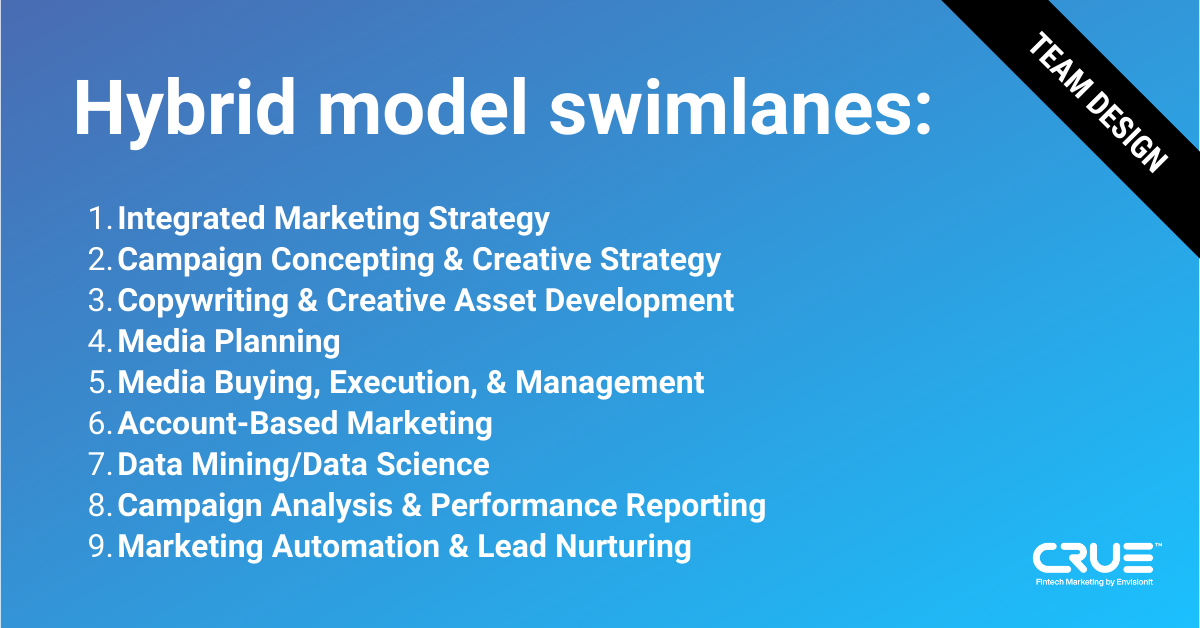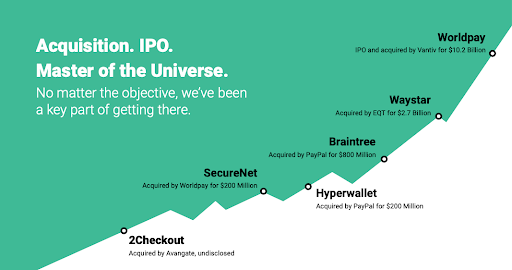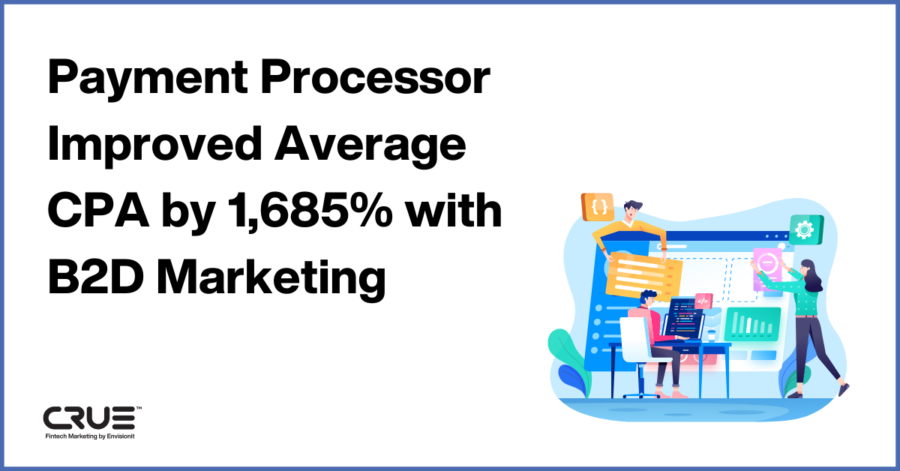How to get the right minds in the right seats whether you’re managing a digital marketing agency, in-house team, or hybrid model
Marketing leaders at fintech companies are very often required to be CTOs, CMOs, CCOs, and maybe the occasional firefighter. But, it’s impossible (and burnout inducing) to bat a thousand in all of those roles all of the time.
Even the World Economic Forum reported that there’s a significant amount of pressure for business leaders to “perform on a multitude of levels,” stating that, “it is now almost impossible for leaders to deliver on all that is expected of them.”
If you’ve ever questioned whether you should hire a marketing agency vs run an in-house team, you’ve come to the right place. Over the past 20 years, we’ve witnessed firsthand what it takes to successfully deliver on your digital marketing strategy, and it starts with having the right minds in the right seats, and the right accountabilities defined around the table.
That’s why our crew of specialists built the Upgrade Your Fintech Digital Marketing playbook. From team design and planning, to decision science and creative strategy, this system will upgrade your annual plan, while impressing your CEO.
Contents in the Ultimate Guide to Designing Your Fintech Marketing Team Structure:
- Track One: Fintech Marketing Agency
- Track Two: In-house Fintech Marketing Team
- Track Three: Hybrid Agency/In-house Model
- Before You Decide: Digital Marketing Roles & Responsibilities
Track One: Fintech Marketing Agency
If you’ve partnered with a fintech agency (we knew you were smart), conduct an audit to ensure the following is true about the combined team and what they’re bringing to the table:
Your agency is willing to challenge your assumptions
If you’re going to RFP agencies, pick one who’s brave enough to tell you that you’re asking the wrong questions or you aren’t seeing the bigger picture. This isn’t an indication of ego or a slick sales strategy. It means they’re going to look out for your wallet, your professional brand, your company, and your team like they are their own.
Choose the agency that introduces you to the people who will work on your business, not just the leaders of each department. Also, if you already have an agency that isn’t telling you what you should be doing before you have to tell them, it might be time to say, “Thank you, next.” They’re either keeping you ahead or they’re causing you to fall behind.
The team roster features strategic planning experts
Your agency should understand the parts and the whole so the “how we’ll get there” doesn’t rest solely on your shoulders. Planning your GTM strategy is just as much an art as it is a science. You should leverage the skillsets of those who have been there and bought the t-shirt.
They’re willing to dig in and truly understand your unique value proposition (even if you haven’t quite figured that out yet)
That means not only understanding your product or solution, but also how you sell it. Additionally, evaluate them based on questions like:
- Do they understand my team and each member’s accountabilities?
- Do they know my internal processes and how things get done?
- Do they know who my key stakeholders are and what I’m on the line for?
These qualities make the difference between a true partner and just another vendor.
They’re transparent about performance and they shoot straight
This seems like a given, until you speak with an agency who is trying to convince you that your performance is solid without giving a single explanation of how said performance is in service of your actual goals.
Truth hurts, but not everything you try is going to work. Sometimes the most impactful change comes from understanding what doesn’t work and why. Any agency partner worth their retainer will not only welcome those direct conversations, but will also be excited to talk through them.
We love how monday.com emphasizes the importance of transparency at work, explaining that teams should make all information—numbers (from KPIs to conversions), cost, roadmaps, plans, challenges, and concerns—readily accessible to everyone to all stakeholders. We fully stand by this at Envisionit.
The agency’s Client Services lead can finish your sentences for you
Often an underrated part of the agency team equation, your relationship with your agency lead can make or break your partnership. They’re a coach, quarterback, cheerleader, (and sometimes, therapist) all in one. So don’t be sold on one person’s media genius or the flashiest creative, because at the end of the day, it actually has to work for you. The right account team makes it happen.
They’re in it to win it, and that goes far beyond their paycheck
In fact, we’d argue that you should consider your agency as one of your greatest assets. To do that, they must be equally committed to celebrating the wins with you as much as they are solving the inevitable challenges that will come up during your engagement (and solving them quickly).
Track 2: In-house Fintech Marketing Team
If you’re handling performance marketing with an in-house team, ensure the following is true:
Your digital marketing team truly digs your company’s offering, and they’re energized by your mission
It seems obvious, but if this is just a job to them, or you’re simply trying to find more “hands on keyboards” as you’re navigating today’s challenging recruiting climate, you’re setting yourself up for tough decisions–and discussions–down the road.
So first, get your priority roles filled with the right talent, particularly mid-to-senior-level leaders who will work across creative, media, and technology where the margin for a mis-hire should be low.
Then, identify the roles where you’re able to lean on tactical versus strategic acumen to simply get the job done, and done correctly. Yes, previous industry experience is a definite plus in fintech.
The ability of a team member to truly hit the ground running by having an understanding of the market, competition, and primary KPIs will take some of the weight off your shoulders. This way, you can focus on developing strong internal partnerships and communicating your progress to the ones who hired you.
Your digital marketing team structure allows for working across the aisle to get it done (particularly among Creative, Media, Product Marketing, and Technology)
We have yet to see a successful fintech digital marketing team whose internal operating mantra is “stay in your lane.” This means things take 5x longer than they should, learning and pivoting is slow, creativity is stifled, and the work leaves more to be desired. It’s a lot easier to explain performance issues to leadership when it’s related to market conditions versus a dysfunctional team who isn’t energized by collective success.
Strategy is owned and led by an individual on your in-house marketing team with strong integrated marketing chops
…And we recommend that someone is not you. This is your right-hand person on your in-house marketing team. The yin to your yang. They know how to grease the squeaky wheels, and most importantly, everything they think about and do in their role is in service of accomplishing the goals you’ve set for your marketing program.
This person is a formidable brand strategist who has deep experience with GTM strategy development and execution for growth-stage companies, and a proven track record. Boasting a keen eye for what will resonate with your targets, this individual will have strong media acumen and demonstrate just as much care for how the leads are handled and nurtured as generating them.
Whether your ultimate goal is installs, transaction volumes, AUM, or something else entirely, there must be careful attention at each stage of the funnel among the various teams, and this leader must be all over it.
You have confidence in and trust your Creative Team’s ability to deliver
From campaign concepts and messaging, to media assets and long form copy, the best fintech digital marketing strategy will mean nothing if your creative strategy isn’t aligned with media, stakeholders, and leadership.
You trust the data you’re receiving from your analysts and data scientists
You know the saying, “garbage in, garbage out?” Well, that’s why we highly recommend investment in talent that is not only good at demystifying the data for you, but also knows what to do when your data plumbing needs fixing. (Or when it needs to be ripped out and replaced entirely.)
Remember, your analysts should have multi-channel digital campaign experience so they can explain to you and your team how your marketing mix is working together, independent of individual channel performance. Lastly, they should have expert-level knowledge of how channels and platforms differ in how they attribute conversion values.
Track 3: Hybrid Digital Marketing Agency + In-house Marketing Team Structure
We’ve given you some guidance on how to successfully partner with a fintech marketing agency, and how to manage a team in-house. But what if you have a hybrid model utilizing both your in-house marketing team and fintech marketing agency?
In our experience, this model can work extremely well if you carefully consider your swimlanes. Speaking of which, they’re typically categorized by, but not limited to, the following:
- Integrated Marketing Strategy
- Campaign Concepting & Creative Strategy
- Copywriting & Creative Asset Development
- Media Planning
- Media Buying, Execution, & Management
- Account-Based Marketing
- Data Mining/Data Science
- Campaign Analysis & Performance Reporting
- Marketing Automation & Lead Nurturing
There isn’t a “one size fits all” approach to the hybrid model as it really depends on the capabilities of your internal team members, many of whom you may have inherited and bring their own skills.

Before You Decide: Digital Marketing Roles and Responsibilities
Prior to making any sweeping decisions around hiring internally or bringing on a digital marketing partner, here are five critical (and often overlooked) questions you should be prepared to answer.
1. Who is accountable versus who is responsible between your marketing agency vs in-house?
While the definition of accountability may seem clear to you, it’s not to everyone. That’s why it’s important to delineate between the two so that people understand the difference.
While one role may not be responsible for completing a project or task, that person may be accountable for ensuring that project or task gets done, is accurate, and reflects your vision. Indeed does a solid job of explaining the difference between the two with examples provided.
There may also be a natural tendency for an individual or a group to take on accountabilities that aren’t theirs. Collaboration is critical and lends to the best results, but ultimately, the buck stops somewhere–and who it stops with should be clearly defined. It’s not just about knowing who the final decision maker is, but establishing who is accountable for the performance of the work itself.
2. Do you have the right level of redundancy to reach and exceed your growth goals?
People take time off. Things happen unexpectedly. What roles are mission critical to the daily operations of your department to the point where, if not regularly accounted for, mean the difference between on-pace performance and, well, a really bad week?
As an example, if you’re managing paid social internally, can anyone else step in to take on that work when your primary point person is out?
3. Who will be your right-hand person at your fintech marketing agency or on your in-house marketing team to identify opportunities and isolate whitespace?
Whether it’s collaborating with sales on isolating your most valuable leads to model from, or determining the best GTM strategy for a new product or feature, the right integrated strategist will help you stay ahead of the game and work across the aisle to take advantage of every opportunity that will move your vision forward.
4. Who are you going to rely on to stay forward-thinking and mitigate risk?
It’s easy for teams to get lost in the day-to-day management of a marketing program. As a result, some really important trends and updates that will directly impact your performance can be missed.
A good example is licensing requirements for fintech advertising – most notably crypto advertising
- Every platform is different, especially for crypto businesses, and this varies greatly by international market. So you’re not only up against the country’s requirements but the platform’s as well.
- Google, for example, is guided by its own set of policies in the space and unfortunately, they often don’t align with our clients’ needs. This is even the case when a specific country allows crypto advertising!
- It’s important to have a very strong partnership with platform account leads who will actually work with you and/or your fintech media agency to not only understand where you can advertise and where you can’t, but also what messaging is acceptable and what will be flagged.
This is where having a fintech marketing agency who already has experience navigating these complexities is a real advantage.
- Additionally, you’ll want to understand a platform’s path to certification in specific markets and the timing of this. Beyond paid search, there are other channels (most notably, programmatic) that really operate like the “Wild West,” and every DSP is different.
- Do you have someone who is familiar with this? Having someone accountable for gathering the information and working with you through your options and requirements is vitally important to the success of your marketing program.
5. Who is going to serve as your integrated project manager, bridging both Creative and Media?
Project management is the cornerstone of a successful marketing operation. However, it’s often the role that is most overlooked.
You’ll want to consider who is accountable for working alongside Strategy, Media, and Creative to develop a detailed project plan with all activities, milestones, and launch dates. This is someone who is fully connected to the goals of the campaign and, more importantly, leads the planning process. They make sure the right documentation is provided to each team at the right time and keep all parties aligned to progress by establishing checkpoints along the way with the right people.
The best project manager is someone who operates with a “no surprises” mindset and who you can trust to raise any red flags throughout the process to get the team back on track.
Digital Marketing Team Structure Wrap Up
Whether you’ve recently stepped into a new marketing leadership position, you’ve been working with the same in-house marketing team or digital marketing agency for years, or you’re assessing going marketing agency vs in-house, it’s always smart to evaluate the effectiveness of your current marketing team structure.
If you’re more clearly seeing the benefits of working with a fintech marketing agency while also maintaining senior marketing leadership in-house, we’re here to talk you through the creation and execution of that model.











